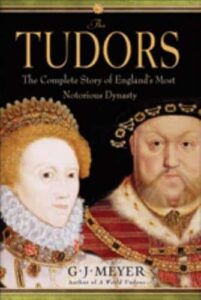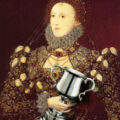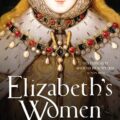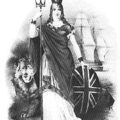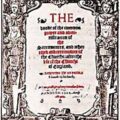I have been reading G J Meyer’s The Tudors: The Complete Story of England’s Most Notorious Dynasty, which is an interesting read, but when I got to the part on Elizabeth my blood began to boil. It started off OK – it actually starts with Elizabeth I’s death – and Meyer writes of how, considering the standards of the day, Elizabeth lived to a ripe old age and that she had a long reign:-
“Elizabeth herself, next to Henry VII the Tudor who overcame the longest odds in coming to the throne, has reigned for four and a half decades. This is nearly twice as long as the first Henry Tudor, nearly a decade longer than the second, nine times as long as either her brother or her sister.”
but then Meyer ruins the moment by saying:-
“Longevity in fact is the dying queen’s supreme achievement, and that is fitting. Longevity, survival, is all she ever really aspired to.”
Now, I know that many modern historians do question the whole “Golden Age” idea of Elizabeth’s reign and point out that this label is rather an exaggeration, but Meyer is going much further than that by saying that Elizabeth’s sole achievement was surviving and having a long reign. How can anyone look at Elizabeth I’s reign, and the woman she was, and say that? It saddens me that anybody can reduce the reign of one of England’s finest monarchs to “survival” and I can only imagine Elizabeth’s reaction if she can read this book in Heaven! Boxed ears come to mind!
Elizabeth I – A Fraud?
Meyer makes things worse by then saying:-
“There is no reason to believe that at any point she had high dreams for her kingdom, her people or herself…Even in fabricating the persona of Gloriana, the strong, wise, and good Virgin Queen, even in projecting that persona in every direction near and far, she has been driven by defensive impulses – by the determination to make herself seem strong, invulnerable, indispensable. Always the aim was to preserve her life and her rule and the status quo. If it is possible to argue that she never accomplished much else, she has unquestionably accomplished that.”
So, are we to understand that Elizabeth was a fraud? That she came to the throne with no hopes or dreams for her reign and country, made up a false image of strength and then just concentrated on surviving? That she accomplished nothing apart from protecting her life and throne? But, hang on, she preserved her throne – isn’t that a huge achievement when she was beset with rebellions and plots, and the Spanish threat? Her throne was in constant jeopardy yet she ruled for over 40 years.
Meyer sees Elizabeth’s reign very differently to many of her biographers. He believes that:-
- The wars during Elizabeth’s reign “accomplished little, almost nothing on the whole” and caused her successors trouble.
- The wars were not necessary and that even the Armada need never have happened because it was caused by Elizabeth goading Philip of Spain until he could take it no more.
- The troubles with Spain caused England huge problems – disruption to trade, unemployment, “ferocious inflation” combined with falling wages, poor standards of living, and “food riots and crimes of desperation” followed by a “vicious crackdown” by authorities.
- Elizabeth was obsessed with her own survival.
- At the end of her reign, Elizabeth was “in every way a spent force, and her people are ready to be quit of her.”
- Mary I was actually “the more ambitious of the sisters – that she aspired to much more than her own survival.”
- England’s economy “was not only primitive by the standards of later times…but provided most of its people with a lower standard of living than they had experienced not just in decades but in centuries.”
He does however credit Elizabeth with two achievements:-
- Settling the question of “what England’s established church should be and do and believe”.
- Giving England “a degree of internal stability not seen in a very long time.”
Unfortunately, he then goes on to say that both of these achievements came at a price “that Elizabeth herself was careful to avoid paying”. Problems were simply stored up for her successors.
I really don’t want you to think that I am having a dig at Meyer because his book is actually very good and is a wonderful examination of the Tudor dynasty. The section on Elizabeth covers religion, the question of succession, Robert Dudley, English theatre, Mary Queen of Scots, the French troubles, the threat from Spain and the troubles in Ireland, war, Robert Devereux… It is a huge section and very well researched, giving a great overview of Elizabeth’s reign, BUT I just hate the way that Meyer cannot give Elizabeth any credit for her reign and also the way that he sees her as quite a pathetic character, someone who was hopelessly vain and who was a bit of a laughing stock. Perhaps I am overprotective of Elizabeth but I don’t see her like that at all.
My Elizabeth I
I love Alison Plowden’s epilogue to her book Elizabeth I, which brings together all four books she wrote about Elizabeth. In this epilogue, entitled “Queen Elizabeth of Famous Memory”, I find “my” Elizabeth, the queen I believe Elizabeth I was. Plowden celebrates Elizabeth’s life and reign and talks about her personality and achievements. She writes about:-
- Lord Burghley calling Elizabeth “the wisest woman that ever was, for she understood the interests and dispositions of all the princes in her time, and was so perfect in the knowledge of her own realm, that no councillor she had could tell her anything she did not know before.”
- How Elizabeth’s greatest strength “lay in her matchless skill in promoting and exploiting her unique relationship with the people of England” and that she never took their love for granted.
- How Elizabeth “so satisfactorily defied the might of Spain and of Antichrist, while at the same time keeping the war out of English territory.”
- Her skills with diplomacy and the way she managed to handle “the balance of power between France and Spain, the balance of factions in France and Scotland, the swaying fortunes of the Netherlands.”
- How her aim was “to keep her people, her kingdom and her throne peaceful, prosperous and secure.”
- How “Elizabeth was, above all, an immensely shrewd and successful practical politician.”
Earlier in the book, Plowden writes:-
“The one thing that can be said of her with absolute certainty is that she loved England and England’s people with a deep, abiding, selfless love. When de Feria remarked that she seemed “wedded to the people” he spoke no more than the literal truth, and it is one of the happy accidents of history that she and they came together at exactly the right moment for them both.” Alison Plowden in Elizabeth I, p178
That is the Elizabeth I know and admire and it is not a pathetic woman who faked her Gloriana image and spent 44 years simply surviving. In her argument for why Elizabeth I should be named England’s Greatest Monarch at the 2007 Festival of History, Sarah Gristwood said:-
“The England she inherited was described by one of her own agents as “a bone between two dogs” – France and Spain. Few believed then that she (a mere woman, with a disputed claim) could hold the throne without tying the country to some greater power. Instead, after 45 years of solo rule, she left a realm sure of its place in the world, with the confidence only half a century of stability could give. One that had seen the expansion of its interests, the securing of its borders, and the regularisation of its currency, as well as the great flowering of the Renaissance.”
Yes, let’s celebrate Elizabeth’s life and reign and give her credit where credit is due!
What do you think?
Sources
- The Tudors: The Complete Story of England’s Most Notorious Dynasty by G J Meyer
- Elizabeth I by Alison Plowden
- England’s Greatest Monarch Is – An article by BBC News on the Greatest Monarch Debate from 2007
 Book Recommendation
Book Recommendation
I am so glad that Anne Boleyn Files and Elizabeth Files visitor, Sabrina, told me about Elizabeth I Collected Works because it has brought me so much joy. That may sound like an exaggeration but it’s wonderful!
This book is divided into different periods – 1533-1558, 1558-1572, 1572-1587 and1588-1603 – and each section includes letters, poems, prayers or speeches written by Elizabeth during that time. I love the photo of the opening of Elizabeth’s letter to her father, Henry VIII, in 1545 as you can see that she obviously made a real effort with her handwriting.
Anyway, the book is a fantastic resource for Elizabeth fans and those doing research into her life and reign.
